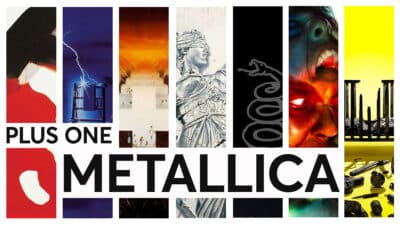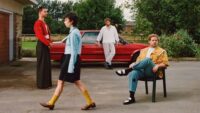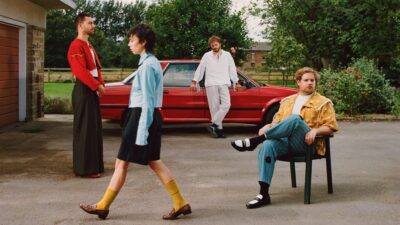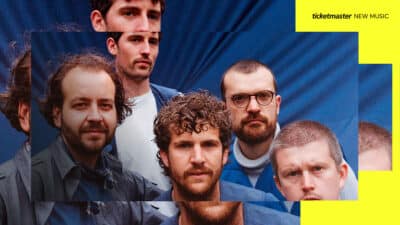Interview

Interview
Arthur Darvill on Oklahoma!: “It’s a really important piece of theatre – it starts a lot of conversations”
The actor talks his Olivier win and how Oklahoma! remains relevant to modern audiences
“I think I just didn’t let myself imagine that it would happen,” says Arthur Darvill, on his Olivier win. At the 2023 ceremony last month, Darvill took home the award for Best Actor in a Musical – a surreal moment for an actor who had spent years convincing himself he just didn’t have “that kind of voice”.
“It’s just kind of sitting on top of my piano at home,” he says, with a laugh. “I look at it every morning when I go down and have a little play on the piano.”
The win may have been a shock to Darvill, but to anyone who had already managed to catch Oklahoma! at Wyndham’s Theatre, it was far from surprising. Arthur Darvill and his complicated Curley are a jewel in the crown of this production – dubbed ‘Sexy Oklahoma’ by many – which doesn’t shy away from the harshness, lustiness and uncomfortably greyness that hides in Rodgers and Hammerstein’s yee-haw romp. After successful runs on Broadway and at London’s Young Vic, the show is now playing to West End audiences, many of whom are leaving Wyndham’s Theatre equal parts dazzled and unsettled.
We caught up with Darvill in-between shows to discuss what it is he loves so much about Oklahoma! and why this musical from the 40s is still resonating with audiences today.
What was it that initially drew you towards this role and this production?
Well, I’d heard about it. I’d never seen Oklahoma! I’d sung some of the songs in my school choir – someone sent me a copy of the CD we made, which was Bromsgrove School Choir: On Show, singing songs from Rodgers and Hammerstein. It’s all very English public school kids singing songs from Oklahoma! and other Rodgers and Hammerstein shows. That was my only reference. I’d seen pictures of the Hugh Jackman one and it just never seemed anything that would appeal to me. And then Jordan Fien, who co-directed at the Young Vic and is a friend of mine, was raving about it when he was over doing it in New York, going “this show’s so great, I think it’s right up your street”. I couldn’t see it, but I listened to the recording. I was like, “Oh, wow, these songs sound amazing.” And then didn’t think anything of it.
So I kind of had an inkling of the type of thing it was, and when I got asked to go up for it, I grilled Jordan about the style of it, and what they were doing with it. He was just effusive about it. It sounded right up my street in terms of just a piece of theatre. And then I listened to the songs again, and really fell in love with them. It’s kind of testament to how brilliantly written they are. They’re just such great songs. And I think what Daniel Kluger has done with the arrangements is really… he’s not even just modernised them, but he’s really brought out the truth in them. I don’t get bored of playing them or singing them.
Do you think that the music is what has allowed the show to translate so well to modern audiences?
I think so. It’s the whole thing – you couldn’t have one part of it without the other. We approached it without taking on any of the preconceived ideas of what this musical is and who these people are. Even though it was a production that already existed, that Daniel had already done in New York, we approached it fresh. It was just about finding the truth in it and not using any preconceptions to play these parts, and really finding out who they were by saying the words to each other. That was really exciting. I think we’ve just kind of stripped everything away from it that could be put upon it. And we’re just giving a truthful depiction of these characters.

When you first walked into rehearsals at the Young Vic, how prepared were you for how different this was from most people’s idea of a London musical?
I was thoroughly prepared. I wasn’t quite prepared for what the process was, though, and Daniel works in a very particular way. Without giving too much away of it, it’s very hard. It’s very demanding, what he asks of you. And he’s very specific about what he wants. I found rehearsals really, really difficult in one of those ways that was really fulfilling, because there’s nowhere to hide. But it was hard. And I think it should be. It felt like we were working on a new piece of theatre, which was really, really exciting.
A lot of people have commented on how well this production manages to balance the ‘frontier fun’ that most people associate with Oklahoma! with the darkness that’s in there as well. Why do you think the show’s been so successful in that?
Well, I think it’s all in the text. I think you couldn’t do this with every show. I don’t think you can do a dark version of Grease. I mean, you could probably try. I kind of hesitate to say ‘dark’ version, actually, because there’s so much light in it. And there’s so much humour in it. But really, the reason it works is because the book’s so good, and the music’s so good, but it’s also based on a play that was written in the 30s by Lynn Riggs, who was writing about the creation of Oklahoma State, and was writing about really complicated, real hard, people. And that’s all still in the show. I think what we’ve done, and what Daniel’s done, is pay homage to that.
I think it’s great to be able to do that in a musical because I think, often musicals lighten things up quite a bit. Because of the nature of it – you’re singing songs. Without putting a style on it, that can be a little bit incongruous, I think we lean into the fact that these characters are singing, and they’re singing for real to each other. Like, I have a guitar, and so when I choose to sing, I’m really singing in the play. And I go, well, this is how I’m going to say this next bit of what I need to say, by singing a song, and kind of revel in it. I think that’s really liberating. And I think that really helps it work.

This isn’t the first time you’ve played guitar live on stage. Were you excited to do that again?
I was really excited. When I did Once, it was like a dream come true. I never really thought I’d do musicals really. Like, I can sing. I was in bands and stuff in my teens and 20s, and Once was like marrying my love of theatre and my love of being in a band, and I could just go out on stage and bring my thing to it. That was really, really exciting. That gave me a real taste for doing musicals. I write a lot of music and a lot of music for theatre, so I kind of had my toe in the world of it, but as a performer I always thought, “Well, I don’t really have that kind of voice – I don’t really like that style of musical singing. I think it’s too clean. I don’t really believe it”. I love going to traditional musicals, and I see the value in it now. But for me, taste wise, at the time, I just thought I was a bit too cool for it. And I was wrong. Youthful me was wrong. I’ve really fallen in love with the form.
When I approached this, the songs are kind of rearranged into kind of a country, bluegrass style – there’s a flavour of that in there. I wanted to be able to sing them properly, and to honour the music. I didn’t want people to come away going, “Yeah, you know, he kind of did his thing with it”. I think the songs are really brilliant, and I wanted to get out of the way of them and just sing them. And so I really took the time to get out of my own way with my habits. And also just doing eight shows a week… I’m 40 now, and to actually sustain it I needed to do this really properly and take it seriously. And I’m really glad I did, because I’ve discovered parts of my voice that I never thought I would use, and a technique that I never really had before. So it’s been amazing. I have an amazing singing teacher, Mary King, who really helped me through that process.
I can imagine that this requires something very different than Once…
I screamed my way through Once. I mean, it was great fun, but I don’t know how I managed to do it eight times a week. It’s a really different style of singing. I’ve listened to recordings of Once and recordings of what we’ve done now, and it’s like, I can’t hear any similarity in my voice between then and now.

I wonder if you could tell me a little bit about the process of taking this show from the Young Vic to the West End?
We actually had a much longer rehearsal period for the West End. During rehearsals for the Young Vic I had Covid for two weeks, and we only had five weeks in total. So I missed a lot of it. I did a lot of my rehearsals on Zoom. We had a much longer rehearsal process for this, but we kind of just tried things out. Daniel’s very experimental, and we were trying different stage configurations and different ways of doing it. A lot of it was for him to see it on stage, to see what worked best in a proscenium theatre. I was definitely really nervous about what that would mean, because at the Young Vic, we were just performing to each other, you know, we could really just look at each other and do the show. I was really nervous about it, but I can say that now, because I think it’s brilliant. I almost think it’s better in this space. It’s almost two different shows.
A lot of the process was just stripping stuff away that wasn’t necessary. I feel like the words are really the most important thing in this show, and we’re just kind of trying to get out of the way of it all. Daniel was very good at noticing when people were doing too much. I think that relationship with the audience is so important. In the Young Vic, we had it for free, because everyone was all around us and you could look at them. It didn’t feel like a choice, it felt like everyone was part of the same community. I think what we’ve managed to do so brilliantly in this production, at the Wyndham’s, is to still include the audience in the community. The lights are still up for a lot of it. It’s meant that we have to play a lot more of it out and trust that it works. Now, it’s a real joy to be able to engage with the audience, even in the confidence of staring straight out at them during scenes.

What do you hope audiences take away from the show?
I think it really explores the complexities of these characters. I think there’s some really big themes in the play which are being explored. Curly is kind of often seen as the hero of the piece. Without putting any judgment on my character, I really like it when people come up and go, “I really didn’t like your character at all”. And I think that’s really important because I think the choice that Laurey has isn’t between good and evil. It isn’t between a good person and a bad person, and isn’t between dark and light. It’s between two very complicated people who both have their own issues. I don’t know whether either of them is very good for her, especially with the way the ending’s dealt with. But I think it prompts a lot of conversations about why certain people are allowed to do certain things because of who they are and where they’re from, and how other people are demonised, and how a community is built around ostracising people. I think that’s really relevant to what’s going on in the world now. And I think it’s a really important piece of theatre because it starts a lot of those conversations.
Oklahoma! with Arthur Darvill is now booking at Wyndham’s Theatre. Find tickets here.









